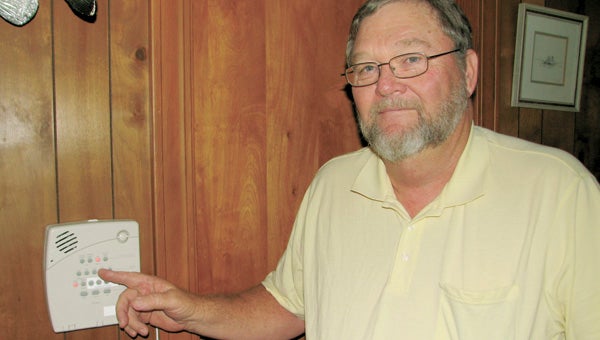Alarmed into compliance
Published 8:39 pm Saturday, July 20, 2013

Joe Simmons checks out the alarm system panel in his Holland-area home. He installed the system several years ago when the area had a rash of break-ins.
Joe Simmons has had an alarm system installed on his Holland-area home for nearly six years — ever since a string of burglaries in the area — and has never had the police called to his home as a result of it.
That’s why it burns him up that he has to pay a city registration fee for his alarm system every year.
“I’m paying a tax every year for something I’ve never done,” he said.
The end of June marked the fourth fiscal year in which the city has charged fees for homeowners and businesses that cause police officers to respond because their burglary or robbery alarms go off needlessly.
The program is accomplishing its goal, Suffolk Police Maj. Stephanie Burch said.
“It’s a huge benefit to us,” she said. “We have reduced (false) alarms by 46 percent. That results in a redistribution of our patrol officers.”
At least two officers respond to every alarm call and are usually there for at least 15 minutes, ensuring nothing is amiss, Burch said. Fewer false alarms means fewer officers tied up needlessly.
“You’re able to redeploy those resources to be available to other calls, and it means reduced response times to legitimate calls for service,” Burch said.
The city implemented the ordinance in fiscal year 2009, but didn’t start charging fees until the next year to give folks time to get used to the new program.
The department decided to introduce the program as a means of reducing the false alarms that took up officers’ time and potentially put them in danger.
But critics — like Simmons, who has written to City Council representatives more than once about the issue — say they shouldn’t have to pay to register their alarms and don’t like that an out-of-state company, Alarm Tracking and Billing Services of Colorado, manages the program for the city. That contract was recently re-bid, and Burch said they are negotiating with the low bidder.
Simmons notes that he sees the sense in trying to reduce false alarms and doesn’t mind that repeat offenders are fined.
“If I’m having problems, fine me,” he said. He doesn’t even mind annual registration. But the registration fee, he added, “is like giving a speeding ticket to everyone who comes by just to make sure you get the right one.”
Homeowners with burglar alarms must pay a $25 registration with a $10 renewal fee each year.
Others say the city has tried to hike program revenue by labeling calls as false that really were not. Officers on the scene make the determination by looking for evidence — doors forced opened, for instance — that a criminal was actually there.
The statistics would seem to support the critics — the percentage of calls labeled as false jumped from 85.5 to 98 the first year the program charged fees.
But Burch said that’s because the department was better educated on what constituted a false alarm. Before the program, they only labeled human error (such as entering an incorrect code on the panel) as a false alarm. But they learned that improper installation and maintenance can also be avoided.
“How we defined false alarms changed when we implemented the ordinance, but not for the purpose of gaining income,” Burch said. “It was based on what the alarm industry was telling us.”
Burch said the department has gotten only a handful of appeals since the program started. (There’s a fee to file an appeal, too.) They will also automatically waive all false alarms during unusual events like hurricanes that cause a large number of false alarms, thanks to windows and doors rattling and extended power outages.
Burch likened the number of false alarms to what would happen if 97 percent of 911 calls were made-up stories.
“That would not be acceptable,” she said. “An alarm is a good tool if used properly and maintained properly. If not, it is a drain on tax-funded resources. Programs like the false alarm program help us put the cost on the person using the services and reduce the cost to the rest of the taxpayers.”






